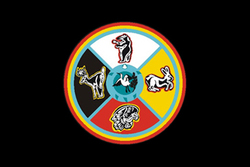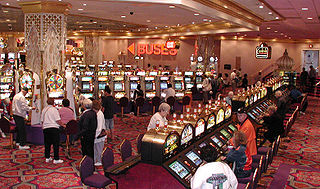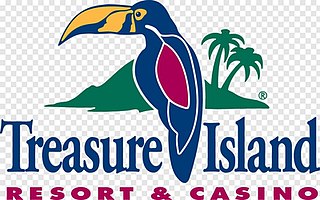
Native American gaming comprises casinos, bingo halls, and other gambling operations on Indian reservations or other tribal lands in the United States. Because these areas have tribal sovereignty, states have limited ability to forbid gambling there, as codified by the Indian Gaming Regulatory Act of 1988. As of 2011, there were 460 gambling operations run by 240 tribes, with a total annual revenue of $27 billion.

The L'Anse Indian Reservation is the land base of the federally recognized Keweenaw Bay Indian Community of the historic Lake Superior Band of Chippewa Indians.. The reservation is located primarily in two non-contiguous sections on either side of the Keweenaw Bay in Baraga County in the Upper Peninsula of the U.S. state of Michigan.

Saginaw Chippewa Indian Tribe of Michigan is a federally recognized band of Chippewa located in central Michigan in the United States.

The Bay Mills Indian Community (BMIC), is an Indian reservation forming the land base of one of the many federally recognized Sault Ste. Marie bands of Chippewa.

The Sault Ste. Marie Tribe of Chippewa Indians, commonly shortened to Sault Tribe of Chippewa Indians or the more colloquial Soo Tribe, is a federally recognized Native American tribe in what is now known as Michigan's Upper Peninsula. The tribal headquarters is located within Sault Ste. Marie, the major city in the region, which is located on the St. Marys River.

Mohegan Sun is an American casino, with 364,000 square feet of gambling space. Operated by the Mohegan Tribe, it is located on 240 acres (97 ha) of reservation land along the banks of the Thames River in Uncasville, Connecticut. It is in the foothills of southeastern Connecticut, where 60 percent of the state's tourism is concentrated. It features the 12,000-seat capacity Mohegan Sun Arena, home of the Women's National Basketball Association's Connecticut Sun. It houses a 350-seat Cabaret Theatre, the 300-seat Wolf Den, and 100,000 sq ft (9,300 m2) of meeting and function room space, including the Northeast’s largest ballroom and 130,000 sq ft (12,000 m2) of retail shopping. It is also where the studio of WMOS is located.

The Grand Traverse Band of Ottawa and Chippewa Indians is a federally recognized Native American tribe located in northwest Michigan on the Leelanau Peninsula. Sam McClellan is the current tribal chairman, elected in June 2016 to a four-year term after succeeding Al Pedwaydon, who served from 2012 to 2016.
The Sycuan Band of the Kumeyaay Nation is a federally recognized tribe of Mission Indians from Southern California, located in an unincorporated area of San Diego County just east of El Cajon. The Sycuan band are a Kumeyaay tribe, one of the four ethnic groups indigenous to San Diego County.

Gambling in the United States is legally restricted. In 2008, gambling activities generated gross revenues of $92.27 billion in the United States.

Bay Mills Community College (BMCC) is a public tribal land-grant community college in Brimley, Michigan. It is chartered by the federally recognized Bay Mills Indian Community of Michigan with a total enrollment of approximately 500 on-campus and online students. The students come primarily from Michigan's eastern Upper Peninsula and are 60% Native American. BMCC is a member of the American Indian Higher Education Consortium (AIHEC), a community of tribally and federally chartered institutions working to strengthen tribal nations, and a land-grant college.

Morongo Casino, Resort & Spa is an Native American gaming casino, of the Morongo Band of Cahuilla Mission Indians, located in Cabazon, California, United States, near San Gorgonio Pass. The casino has 310 rooms and suites. A 44-acre (180,000 m2), 27-story resort, Morongo is one of the largest casinos in California. At 330 feet (101 m) high, the casino tower is the tallest building in both Riverside County and the larger Inland Empire region.

Pokagon Band of Potawatomi Indians are a federally recognized Potawatomi-speaking tribe based in southwestern Michigan and northeastern Indiana. Tribal government functions are located in Dowagiac, Michigan. They occupy reservation lands in a total of ten counties in the area.
The United Auburn Indian Community (UAIC) is a federally recognized Native America tribe consisting mostly of Miwok Indians indigenous to the Sacramento Valley region.
Saganing Eagles Landing Casino is a casino located just outside the city of Standish, Michigan, United States. Opened on December 31, 2007, the casino is owned by the Saginaw Chippewa Tribal Council, which also owns the Soaring Eagle Casino in Mount Pleasant, Michigan. This is located on the tribe's Isabella Indian Reservation.

The Paskenta Band of Nomlaki Indians, or in their own language Nomlāqa Bōda, is a federally recognized tribe of Nomlaki people. The Nomlaki are Central Wintun, or River and Hill Nomlaki, an indigenous people of California, located in Tehama and Glenn counties.
Michigan v. Bay Mills Indian Community, 572 U.S. 782 (2014), was a United States Supreme Court case examining whether a federal court has jurisdiction over activity that violates the Indian Gaming Regulatory Act but takes place off Indian lands, and, if so, whether tribal sovereign immunity prevents a state from suing in federal court. In a 5-4 decision, the Court held that the State of Michigan's suit against Bay Mills is barred by tribal immunity.

Treasure Island Resort & Casino is a tribal gaming facility owned and operated by the Prairie Island Indian Community (PIIC) in Welch, MN – Goodhue County. It is the only casino resort in southern Minnesota located on the Mississippi River. The casino’s gaming options include slot machines; video roulette, blackjack and keno; live dealer blackjack, poker and other table games; and bingo. Additional amenities to the property include a 788-room hotel, the Treasure Island Amphitheater, the Island Event Center, a marina, RV-park, a cruise yacht, an indoor waterpark, a spa, a 24-lane bowling center and arcade, and several restaurants. Employing nearly 1,500 people, Treasure Island Resort & Casino is the largest employer in Goodhue County.

Bay Mills Resort & Casino is a casino and hotel located in Brimley, Michigan on the shore of St. Mary's River, which opened in November 1995. It is owned and operated by the Bay Mills Indian Community.

The Kewadin Casinos are a set of casinos located in the US state of Michigan. The casinos are owned by the federally recognized Sault Tribe of Chippewa Indians. The primary property is located in Sault Ste. Marie, with additional locations on tribal lands in Christmas, Hessel, Manistique, and St. Ignace.

The impact of the COVID-19 pandemic on Native American tribes and tribal communities has been severe and has emphasized underlying inequalities in Native American communities compared to the majority of the American population. The pandemic exacerbated existing healthcare and other economic and social disparities between Native Americans and other racial and ethnic groups in the United States. Along with Black Americans, Latinos, and Pacific Islanders, the death rate in Native Americans due to COVID-19 was twice that of white and Asian Americans, with Native Americans having the highest mortality rate of all racial and ethnic groups nationwide. As of January 5, 2021, the mortality impact in Native American populations from COVID-19 was 1 in 595 or 168.4 deaths in 100,000, compared to 1 in 1,030 for white Americans and 1 in 1,670 for Asian Americans. Prior to the pandemic, Native Americans were already at a higher risk for infectious disease and mortality than any other group in the United States.

















